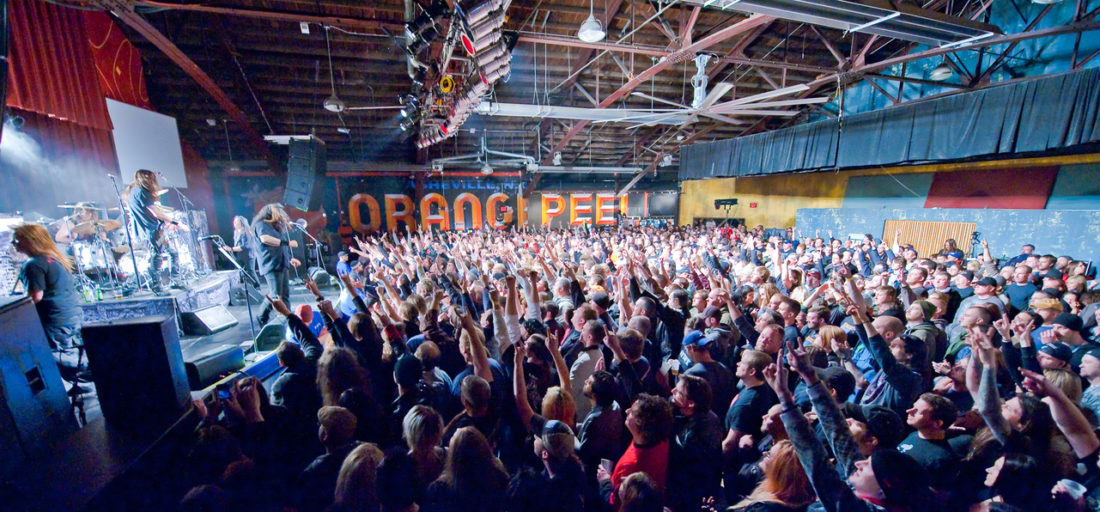Whether complimentary, critical or somewhere in between, Asheville lands on so many lists that when the city doesn’t make the cut — particularly in regard to music — it raises a few eyebrows.
Such was the case this February when real estate data company Clever published the study, “Best Music Cities in the U.S. (2022 Data).” Nashville took the top spot, and Raleigh and Charlotte were also among the report’s 50 metro areas, but Asheville was nowhere to be found.
The explanation is simple: The city’s population doesn’t rank in the nation’s top 50. But with Asheville seemingly a lock for any conversation involving the nation’s top music destinations, it’s nevertheless a good time to examine the local music industry and see how its lauded reputation holds up when examined with Clever’s rubrics.
Methods, madness, etc.
Taelor Candiloro, a research analyst for Clever and the report’s author, says that she and her colleagues determined what metrics and statistics to use for the study by considering what elements of lived experience would make a city conducive to a good music scene.
“I think viability has a lot to do with both affordability and opportunity, so we tried to measure those things by choosing metrics that reflect those aspects of a city,” she says.
In addition to the widespread advantages of a diverse music scene, Candiloro noticed that the top 15 metros also ranked high in the total number of working musicians and intimate concert spaces, while ranking low in concert ticket prices.
“I think these [qualities] speak to healthy music landscapes and are really helpful to note if you’re in a city that didn’t make the top 15 but absolutely has a strong music scene to build upon,” Candiloro says.
Furthermore, the report notes that researchers “analyzed publicly available data from the U.S. Census Bureau, Bureau of Economic Analysis, Bureau of Labor Statistics, Indie on the Move and more.” Each metric was normalized and then graded on a 100-point scale. The combined weighted average of the scores determined the “Music City” score upon which the final ranking was based.
Nashville’s top spot on the report, continues Candiloro, came as no surprise. The Tennessee capital ranked No. 1 for full-time musicians per capita (127 per 100,000 residents) and intimate concert spaces per capita (6.7). Meanwhile, its overall cumulative genre score — based on Google trends data for 20 styles of music — fell second only to Salt Lake City. The report also found that Nashville’s career musicians earned more hourly ($28.81) than 30% of the study’s cities and the average ticket price ($130) ranked better than 32% of all other featured metros.
Candiloro hopes that the opportunity for improvement across metrics is one of the main takeaways that cities within the Top 50 and beyond get from the study, which will likely be conducted again next year. Additionally, she hopes all cities, regardless of size, think critically about how to encourage healthy and sustainable music scenes.
“I think it comes down to a city investing in what it’s already got going on,” she says. “Is the city investing in the arts community? Asheville has a great foundation when it comes to creative spaces and music venues — the interest and personal investment in the local music scene is definitely there. I think the city can rally around that foundation and support it through funding events, entertainment — especially as we near the warmer months of the year — and affordable housing options. All those things not only draw creative minds to the city but help to keep them there.”
Local stats
When asked to comment on the “Best Music Cities” study’s metrics and findings — and how Asheville stacks up to these standards — members of the local arts industry were largely optimistic.
Candiloro’s statement regarding cities investing in their current artistic strengths rings especially true for area leaders, including Katie Cornell, executive director of the Asheville Area Arts Council.
“If our city and county really want to top the charts, they have to start investing in and developing this area’s biggest cultural assets, such as the local music industry,” Cornell says. “I also think that until the affordable housing issue is solved or at least better managed, it is going to be hard for any sector to truly thrive.”
Studies that support Asheville’s claim to “Music City” fame include one by Best Cities in 2020 that ranked Asheville the fifth-best small city in the U.S., primarily for its art and music offerings. Jessica Tomasin, co-founder of the nonprofit industry advocacy group Asheville Music Professionals, and Heidi Reiber, senior director of research for the Asheville Area Chamber of Commerce, also partnered with the Nashville Area Chamber of Commerce in 2016 for “Asheville Music Industry: Cluster Analysis and Economic Impact.”
“We were very fortunate to have an opportunity to work with Dr. Garrett Harper, who was the vice president of research for the Nashville chamber at the time,” Reiber says. “Dr. Harper had conducted research including economic impact analysis for Nashville’s music industry, and we had an opportunity to partner on a similar study for Asheville, keeping in mind each region has its own unique attributes.”
Looking at data from labor market data company Emsi for musicians and singers, but excluding tech/support roles, Reiber estimates that new full-time and part-time jobs were added most years from 2009-19 with a slight downturn in 2019, but experienced 41% growth overall in this 10-year snapshot — greater than that of the Nashville-Davidson Metro (26% growth). But as the COVID-19 pandemic hit, estimates suggest that 2020 employment in the musicians and singers occupation dropped to 949 in the Asheville metro, a loss of 14% compared with 2019.
“Related closures due to the pandemic played a role in contributing to these losses,” Reiber says. “However, the presence of musicians and singers in the area remains strong. In 2020, there were 69% more musicians and singers in the Asheville metro compared to the national average. This measure suggests a level of specialization and uniqueness in our metro that is not found in every region.”
The real deal
As far as reputation goes, Cornell points to a 2019 Rolling Stone article that says, “Asheville is becoming one of the country’s most vital music hubs.” The piece highlights the city’s diverse music scene and includes native son and rock legend Warren Haynes touting his hometown.
Katie Hild, co-owner of Salvage Station, also feels that Asheville’s reputation as a “Music City” has grown in recent years, largely based on the steady uptick in major nationwide tours that choose her venue and others in the area. “And we hope to see that trend continue,” she says. “The caliber of artists interested in performing in our city is impressive, considering the size of Asheville.”

And on the ground level, local artists such as Andrew Fletcher, a pianist and AMP board member, express similar positive takes.
“The magic of Asheville is the density of what’s going on here,” he says. “It means that there’s lots of interactions between bands and musicians, and the pace of those interactions is definitely part of what makes the music scene. The fact that I can easily go see three shows on a Friday night on Lexington Avenue — and not walk more than a few steps between venues — is pretty awesome. It’s a huge part of why I chose to live here.”
Though he considers the Clever study to be more geared toward audience metrics than for the benefit of musicians, Fletcher is surprised that some of the cities aren’t necessarily tourist-driven, particularly Indianapolis, which earned the No. 2 overall ranking. Driving that result is a comparably low average concert ticket price ($99); a No. 4 ranking in small concert venues per capita (5.3 per 100,000 people); full-time musicians (34 per capita) earning more hourly ($31.40) than artists in 40% of the study’s cities; and a No. 3 ranking in Google trends for country music and No. 5 for both alternative music and blues. Yet Fletcher wasn’t aware of that reputation, and he doubts many industry peers would think of the Indiana capital as a more desirable music city than Portland, Ore. (No. 3) or Austin (No. 4).
Charlotte’s inclusion (No. 12 overall) was also unexpected for Fletcher. Though he notes the city’s “good, interesting hip-hop” scene, along with a strong number of artists from various other genres, Fletcher asserts that it’s difficult to find a bar in the Queen City without a television. Such spaces that prioritize live music without having performers compete with screens, he continues, is one of “those little steppingstone/ building blocks of a bigger music scene.” As such, Fletcher considers the study’s metric for small venues per capita a critical measurement.
“That shows that if the low level, grassroots is thriving, that’s going to be the incubator for the bands that get bigger,” he says. “Almost all bands were local at one point, and they need a lot of stage time in a lot of different small venues to hone their craft and songs so they can get to that next level.”
Not included in the study but likewise important to Fletcher are the inputs to a music industry or scene, including open mics, busking, college programs and whether it’s a destination city for musicians. Also critical are factors that would diminish the music scene, namely affordability issues, an individual venue closing and other factors stemming from gentrification — all of which contribute to two of the most daunting components: cost of living and earnings.
“If you look at musician wages and compare them on a trend line to affordability, when those lines begin to get closer together and cross, that might be that ‘canary in a coal mine’ moment,” Fletcher says. “Cultures come and go, and they often arise from a complex mix of internal factors that are difficult to manufacture and can fade due to external threats such as gentrification. It’s something that I hope policymakers seeking to celebrate our music culture will carefully consider.”





Before you comment
The comments section is here to provide a platform for civil dialogue on the issues we face together as a local community. Xpress is committed to offering this platform for all voices, but when the tone of the discussion gets nasty or strays off topic, we believe many people choose not to participate. Xpress editors are determined to moderate comments to ensure a constructive interchange is maintained. All comments judged not to be in keeping with the spirit of civil discourse will be removed and repeat violators will be banned. See here for our terms of service. Thank you for being part of this effort to promote respectful discussion.